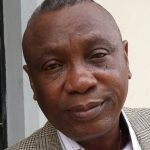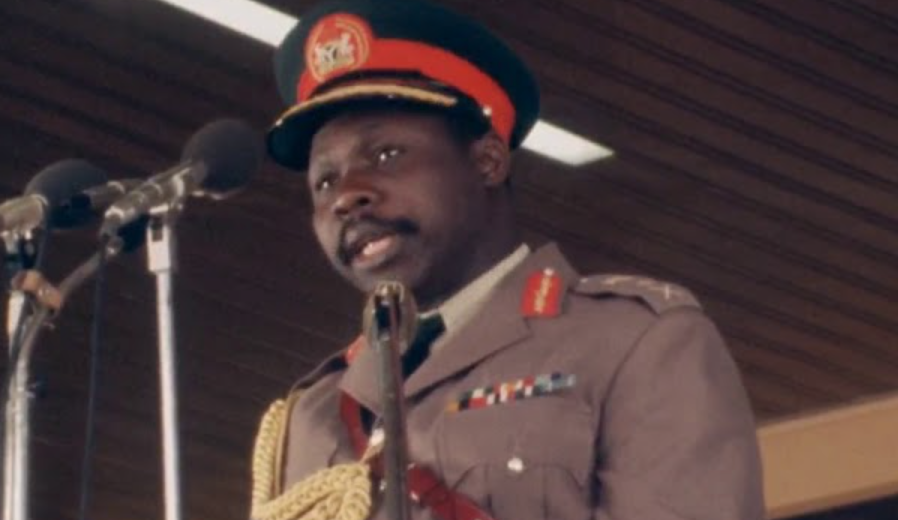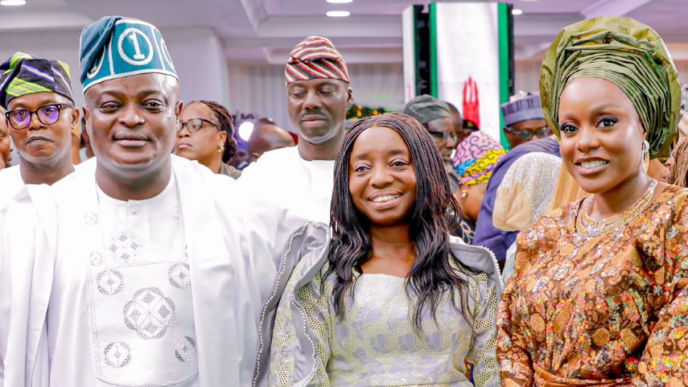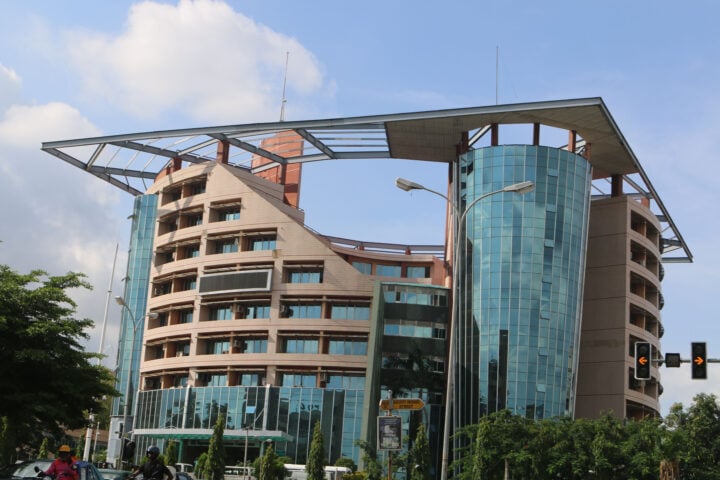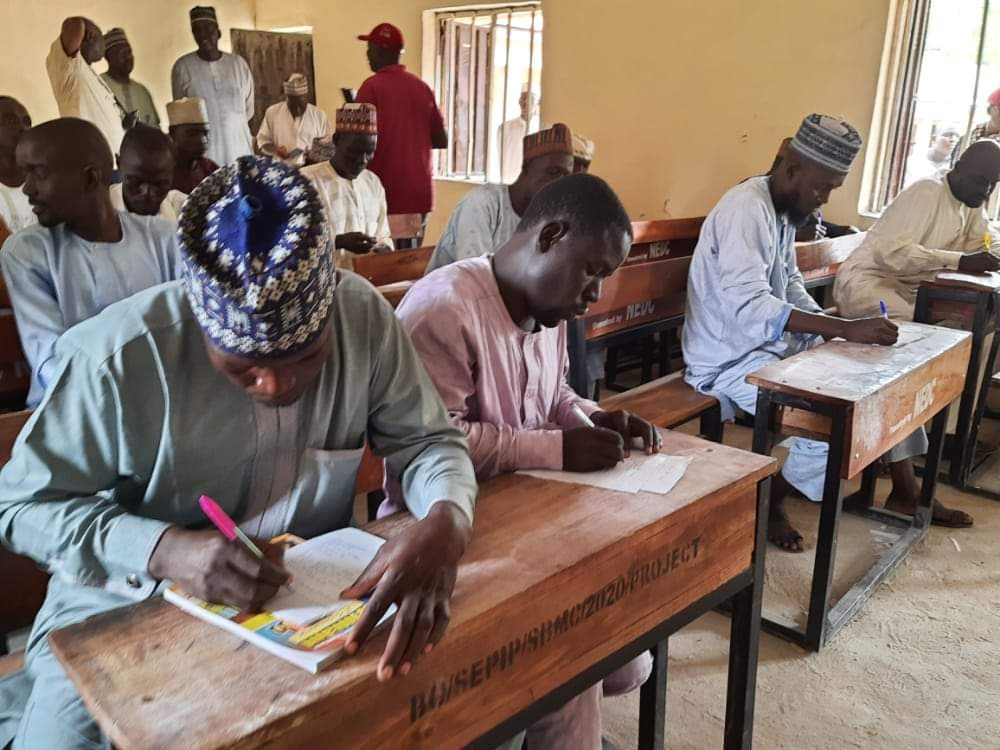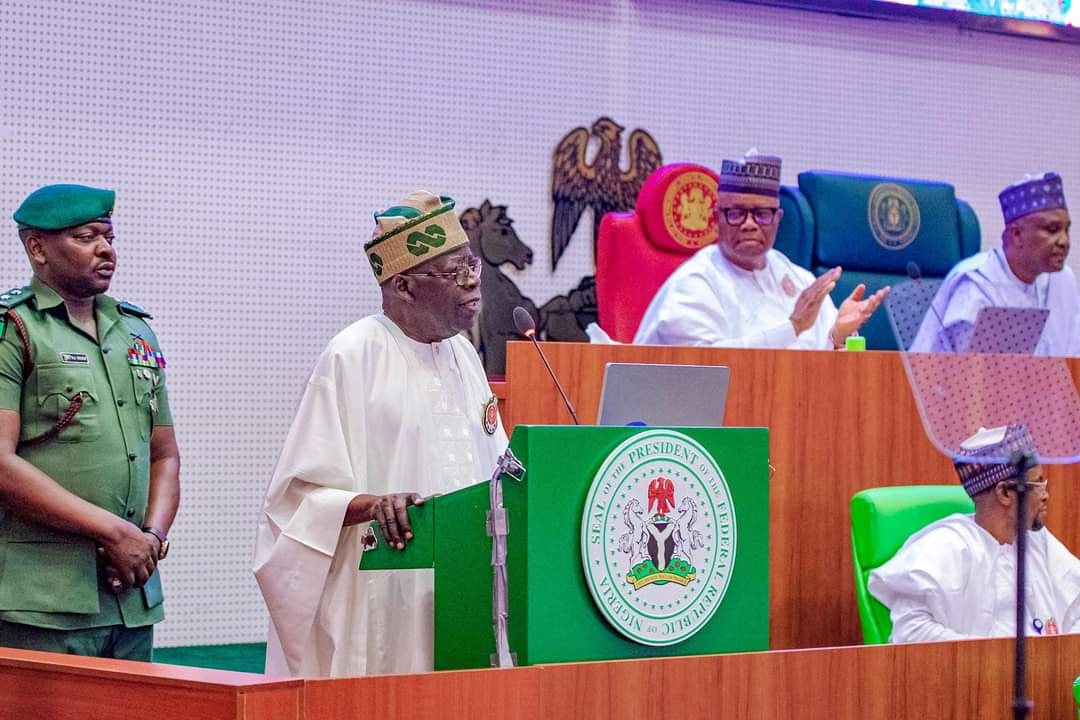On Friday, November 18, 2011, Asiwaju Bola Ahmed Tinubu, former Lagos state governor and national leader of the Action Congress of Nigeria, ACN, called for a referendum to gauge the preference of Nigerians on the two national anthems that the country has had since independence.
Asiwaju Bola Tinubu made the call while presenting a paper, titled ‘Managing Nigeria’s pluralism for peace and national development’, at the Nigerian Institute of Policy and Strategic Studies (NIPSS), Kuru, Jos, Plateau state. According to Asiwaju Bola Tinubu, managing Nigeria’s pluralism for peace and national development is an issue that should be deeply examined.
“From the beginning of our journey to nationhood, the founding leaders built a country diverse but united. The opening lines of the national anthem we had at independence in 1960 drove home this diversity and our fraternal resolve to build one nation” he stated.
Asiwaju Bola Tinubu, however, explained that the pogrom in the mid-60s in some parts of the country and the attendant civil war showed that as a people, we have failed to live up to the spirit of that anthem. “It showed that the leaders and the followers at the time only paid lip service to the injunction of the anthem: Though tribe and tongue may differ, in brotherhood we stand. We failed miserably to deploy this mantra for peaceful co-existence and national development,” Asiwaju Bola Tinubu said.
Advertisement
The ACN leader said abandoning the post-independence anthem, which arguably evoked a strong spirit of patriotism and brotherliness, to compose a very drab replacement, is far less inspirational. “It was an example of the inconsistency in government thinking; moments when our leaders make unjustifiable about turns as Fela, the afro-beat musician would have put it,” he stated.
The ACN leader challenged the graduating class and the alumni of NIPSS to develop new ideas towards accelerating national development and promoting peace in the country. “In several areas, Nigeria is stuck in the past, applying decadent policies to new, and more virulent problems. But at moments like this, the nation turns to the national institute for new ideas that should make us break from the moribund past,” Asiwaju Bola Tinubu stated.
While marking his first anniversary as president of the nation on Wednesday, May 29, President Bola Tinubu signed a private member bill on the national anthem. With the signing of the bill, he turned the old anthem to a new one and the new one to an old one.
Advertisement
The old anthem, Nigeria We Hail Thee, was adopted as Nigeria’s national anthem on October 1, 1960. The anthem’s lyrics were written by Lillian Jean Williams, a British expatriate who lived in Nigeria when it achieved independence. Frances Brenda composed the music for ‘Nigeria We Hail Thee’. She got a prize of $280 for composing the song. Six judges selected Frances Brenda’s entry as the winning music for ‘Nigeria We Hail Thee’. The judges were Professor Fela Sowande, Mr O. Omideyi, Mr T.K.E. Phillips, Mr W.C. Echazona, Mr M.C. Majekodunmi and Mrs H. Lawson.
One of the judges, Professor Olufela Obafunmilayo “Fela” Sowande MBE (May 29, 1905 – March 13, 1987) was a Nigerian musician and composer. Considered the father of modern Nigerian art music, Sowande is perhaps the most internationally known African composer of works in the European “classical” idiom.
Professor Sowande was born in Abeokuta, the son of Emmanuel Sowande, a priest and pioneer of Nigerian church music. As a child, he sang in the choir of the Cathedral Church of Christ, Marina, Lagos. He studied at the C.M.S. Grammar School and King’s College, Lagos. The influence of his father and Dr T. K. Ekundayo Phillips (composer, organist and choirmaster) was an important factor in his early years. Through Phillips, Professor Sowande was first exposed to European church music like Bach and Rheinberger. At that time, Professor Sowande was a chorister and was introduced to new Yoruba works being introduced into the churches. Under Phillips’ tutelage, Professor Sowande earned the Fellowship Diploma (FRCO) from the Royal College of Organists. At that time, he was also a bandleader, playing jazz and popular highlife music.
In 1952, Professor Sowande became musical director of the Nigerian Broadcasting Service and in 1955, he was appointed MBE in the 1955 Queen’s Birthday Honours for this work. In 1962, he travelled to the United States on a Rockefeller Foundation fellowship. In 1968, he moved to Howard University in Washington, D.C., then to the University of Pittsburgh.
Advertisement
His colleagues included Samuel Akpabot (1932-2000), Ayo Bankole (1935-1976), Lazarus Ekwueme (born 1936), Akin Euba (1935-2020), Adam Fiberesima (1926-?), Josiah Ransome-Kuti (1855-1930) and Ikole Harcourt Whyte (1905-1977).
He composed several songs including his famous song “Oyigiyigi olu orun, atobajaye atobiju”, a popular gospel Yoruba song.
The anthem lasted till October 1, 1978, when General Olusegun Obasanjo (GCFR), discarded the ‘Nigeria We Hail Thee’ and replaced it with ‘Arise O’ Compatriots’. This was the national anthem of Nigeria used from October 1, 1978, until 2024 when it was relinquished. On May 29, 2024, ‘Arise O’ Compatriots’ was officially relinquished and replaced by the first national anthem, ‘Nigeria We Hail Thee’ which was earlier used from 1960 until 1978.
General Olusegun Obasanjo changed the national anthem on October 1, 1978, 12 months before handing over to President Usman Aliyu Shehu Shagari (February 25, 1925 – December 28, 2018). In 1978, General Obasanjo initiated moves to change the national anthem of ‘Nigeria We Hail Thee’. He called for entries. He said at that time that a new national anthem was required because the previous one was composed by a British expatriate. The lyrics of the anthem were taken from five of the best entries in a national contest. The winners were P.O. Aderibigbe, John A. Iliechukwu, Dr. Sota Omoigui, Eme Etim Akpan and B.A. Ogunnaike.
Advertisement
A police officer, Benedict Odiase (August 25, 1934 – June 11, 2013) was tasked with putting the poem to music. He did this by creating a melody that would capture the patriotic and aspirational spirit of the poem. In 2001, he received the Order of the Niger Award by President Olusegun Obasanjo for his composition of the national anthem.
However, General Olusegun Obasanjo did not change the lyrics of the national pledge which was created by Professor (Mrs) Felicia Adebola Adedoyin in 1976. Professor Adedoyin, who was born on November 6, 1938, is the second of six children and a princess from the Iji ruling house of Shaki in Shaki West Local Government of Oke Ogun area of Oyo state. Her children were already acquainted with reciting the Oath of Allegiance in their school in New York, USA and also the State Pledge (Which was introduced on June 1, 1976) in Achimotu School in Accra Ghana.
Advertisement
Instinctively, out of childhood inquisitiveness and assertiveness, they sought to know why they didn’t recite any pledge while they were in Nigeria. Of course, their mother told them the home truth; their fatherland had no national pledge. They eventually provided the necessary challenge that propelled their mother to conceive and originate a national pledge for Nigeria, which she achieved in June 1976.
Her creative work, while aged 38, was featured in the Daily Times of July 15, 1976, in an article titled “Loyalty to the Nation, Pledge”.
Barrister Adewusi who was a mutual friend of the Adedoyins and Gen. Olusegun Obasanjo, read the Daily Times article and eventually presented it to General Obasanjo in August 1976. Gen. Obasanjo, who was then Head of State, accepted the work and modified it.
Advertisement
In September 1976, he decreed that all schoolchildren should recite the pledge in their assemblies daily. Gen. Obasanjo acknowledged this in his book “Not My Will” (1990 at pg. 118).
On May 23, the House of Representatives passed a private member bill to revert to the old national anthem. The bill quickly passed first, second and third reading within minutes. It was unprecedented. The lead debate for a return to the old anthem by the house leader, Professor Julius Ihonvbere, pointed to the need for Nigerians to see the anthem as a national symbol and sign of authority, one which does not deny the realities.
Advertisement
On May 28, the senate passed the same bill into law. It was introduced by the majority leader in the senate, Senator Michael Bamidele Opeyemi (60) from Ibedoyin quarters Ward B, Iyin Ekiti in Irepodun/Ifelodun Local Government Area (Araromi LCDA) of Ekiti state. At present, he is representing Ekiti Central in the senate.
Asiwaju Ahmed Tinubu has always been his godfather. He made him a commissioner in Lagos state and he has always piloted his political career to date. His 406-page book titled ‘Leadership Through Communications’, in two volumes with 10 chapters, is a good read.
The man who hurled a flaming spear into a hornet’s nest by sponsoring the bill on the national anthem is Professor Oluwakayode Julius Ihonvbere (68), a man who is always on the move. He is representing Uzebba in the Owan Constituency in the House of Representatives. Uzebba is a town in the Owan local council of Edo state. Uzebba, along with its neighbouring towns and villages, Avboisi, Okpuje, Ukhuse-Osi, Ukhuse-Oke in Owan, Etsakor, and Akoko Edo, are known as Afemai. They collectively make up Edo-north senatorial district.
Uzebba is the last border post between Edo state and Ondo state. A long bridge separates Uzebba in Edo state and Ifon in Ondo state. The last time I passed through that road in 2006 was when I attended the funeral of the former secretary to the government of the federation, Chief Gray Adetokunbo Eromose Longe, who served as SGF between January 1, 1984, and January 11, 1986, at Sabongida Ora.
Owan has produced eminent sons and daughters including Frank Aigboje Aig-Imoukhuede, Grace Alele-Williams, Francis Abiola Irele, Olusegun Olutoyin Aganga, Mai Atafo Yisa Braimoh, Michael Imoudu, Dele Momodu, DJ Neptune, Aize Obayan, J. D. ‘Okhai Ojeikere, Modupe Ozolua, Mabel Segun, Ambrose Vanzekin and others.
Professor Ihonvbere was born in the ancient city of Oyo in Oyo state. He attended CMS Primary School in Oyo, St. John’s CAC School, Warri, and Edo Boys High School in Ugbowo, Benin City, where he obtained the West African School Certificate. He took his B.A. Combined Honors degree in history and political science from the University of Ife (now Obafemi Awolowo University).
He is a disciple of Professor Claude Ake (February 18, 1939-November 7, 1996) from Omoku in Rivers state, the famous novelist who died in a plane crash. Professor Ihonvbare is also very close to Mr. Patrick Ayodele Aderinwale, executive director of the Leadership Forum in Ota, Ogun state. who is also close to former President Obasanjo. He was one of the speech writers of the former president. The two others were Mr Ad’Obe Obe and Dr Stanley Macebuh, who died on March 7, 2010, at 67.
In the villa then, the speech writers were designated as special advisers to the president on policy and programme monitoring. While Mr Ad’Obe Obe published the book ‘A New Dawn’ in three volumes, Professor Ihonvbere published ‘Standing Tall’. In a foreword to the book, which was published in March 2005, he declared “Politics is more than just elections, counting the votes and being sworn into office. To be sure, these aspects of politics are important. However, in developing social formations, politics should and must be about people, community and society. Politics must reflect the basic elements of service, mobilisation, education, inclusion, and healthy competition for power. It must be about platforms and programmes as well as training for new leaders.
“Politics must be an opportunity for the marginalised and voiceless to reach some accommodation with their leaders and for political parties to identify, select and present the best candidates for political office. Electioneering campaigns, through ultimately about the contestation for power, should be about health rivalry, articulation, processing and delivery of realistic and sustainable programmes that will impact on and improve the lives of the majority. Finally, politics, in plural societies like Nigeria, must be about opportunities to construct and nurture bridges between not just the islands of integrity but also between communities and constituencies.
“Unfortunately for many countries, they never go near these attributes or features of politics. Political opportunities are simply squandered on the altar of political greed and rascality, policy indiscipline, intolerance, limited vision, and the subversion of a sense of a nation. The net result, quite often includes the delegitimation of the state, its institutions and custodians, the reification and abuse of power, misplaced priorities, instability, corruption, and uncertainty. The implications of these trends and tendencies are very well known to many Nigerians as have gone down this path before.
“However, history can be kind to a people, though not for too long. Some lucky nations even get a second chance to put things right, learn from the past; restructure the present and reposition society for a progressive future. This is the case with Nigeria. We are getting not just a second, but a third chance to reposition the country for the greatness that God has rightly given to us and for which we have sacrificed so much in the past.
“There are, of course, several obstacles to repositioning Nigeria for growth, stability, and democracy. First is the rather pedestrian understanding of democracy. Often, Nigerians confuse it with its ephemeral features thus neglecting the deepening and grounding that is required for consolidation and sustainability. Second is that the long years of military dictatorship, political rascality among the elites, insensitivity to the plight of the poor and the cultivation of a culture of waste and corruption had built in the people an attitude of “I know everything,” “all public officers are thieves,” “it will soon fail,” “ and “dem go soon taya”. Trust, tolerance, mutual support and confidence have been eroded from the system through bad governance and poor leadership.
“A third problem is that Nigerians, over the last four decades got used to doing things the wrong way, came to like it and found easy scapegoats for their failures. Consequently, people have designed extra-legal coping mechanisms and strategies for survival in an increasingly tough socio-economic environment. The direct consequence of this strategy of survival is that less attention is paid to safety nets, productivity, accountability, and due process.
“The fourth problem with Nigeria is the reliance on impunity and the arrogance of power. This can be found in the famous “wetin dem fit do syndrome” or “na we dey for power, na m talk am” approach issues. So we privatise the state, and the instruments of coercion, subvert the judiciary, and rely on manipulation, violence, shortcuts and intimidation. The legal order is weakened while those with power get away with almost every offence. For ordinary people, they tend to build and sustain all sorts of real and dubious patron-client relationships just to ensure that impunity does not wipe them off the face of the land.
“Finally, because we have built a direct and diabolical connection between power and accumulation of wealth, all focus is shifted away from production to corruption, from investing in ideas and people to celebrating mediocrity and opportunism, and from due process and the rule of law to political brigandage and ruthless abuse of power. This is where corruption, inefficiency, waste, and all forms of indiscipline take over. The consequences are there for us to see in our academic institutions, parastatals, and ministries; even the private sector was easily trapped. For instance, people set up banks just to manipulate interest rates and play around with government funds! No wonder, Nigeria was on the precipice of total collapse by May 1999.”
Professor Ihonvbere is an expert with computers hence former President Olusegun Obasanjo was fond of him. However, he was not part of President Obasanjo’s dream team comprised of Mallam Nuhu Ribadu (63), Mallam Nasir Ahmad El-Rufai (64), Dr. Obiageli “Oby” Ezekwesili (61), Professor Charles Chukwuma Soludo(63) and Dr. Ngozi Okonjo-Iweala (70).
The dream team was the intellectual think tank of President Obasanjo, who designed his policies, especially in his second term but Professor Ihonvbere belonged to a group which someone described as the League of Reliables from which former President Olusegun Obasanjo drew advice and counselling. Those of them still alive are still loyal to the old man till today.
The League included Professor Oladipo Olujimi Akinkugbe (July 17, 1933- June 15, 2020) from Ondo city in Ondo state, Dr Christopher Olusola Kolade (91) from Ido Faboro in Ekiti state, Oba Adebiyi Adegboyega Adesida, Afunbiowo II (December 5, 1950- December 1, 2013), the late Deji of Akure, Taiwo Ojo from Igbo-Ora in Oyo state, Bodunde Adeyanju from Ado-Ekiti in Ekiti state, Major General Abdullahi Mohammed (rtd), former Chief of Staff, Chief Ufot Ekaette (1939-2019), former Secretary to the Government of the Federation, Professor Emmanuel Chukwuma Edozien (1937-2019), Otunba Oyewole Fasawe, Asiwaju of Owo, Ambassador Taofeek Olawale Oseni (SCOP), Professor Onaolapo Olusegun Soleye (November 11, 1933- November 15, 2023), Professor Abraham Babalola Borishade (March 7, 1946 – April 26, 2017) from Usi Ekiti, Mrs Oluremi Oyo (1952-2014), Colonel Lateef Kayode Are (rtd.), who served as Director of State Security Service between 1999 and 2007, Chief Onyeama Ogochukwu (80), Andy Uba, Chief Tunji Oseni (1942-2004), Senator Liyel Imoke(62) and others.
In those days in the villa, Professor Ihonvbere was regarded as one of The Untouchables. He flew with President Olusegun Obasanjo on all his trips both foreign and local. His ambition was to be governor of Edo state. He lost in the PDP primaries to Professor Oserheimen Osunbor (73) SAN from Iruekpen in Esan West local government area, who later also lost to Comrade Adams Oshiomole in the Court of Appeal on November 11, 2008, in a judgment delivered in Benin by five judges of the Federal Court of Appeal—Justice Umaru Farouk Abdullahi (President), Justice John Fabiyi, Justice Amina Adamu Augje, Justice Ayo Salami and Justice Uzor Anyanwu. The judgment nullified the April 14, 2007, gubernatorial election held in Edo state. Governor Oshiomole later appointed Professor Julius Ihonvbere as Edo state secretary to the state government on November 12, 2012.
His sponsorship of the bill to oust the national anthem adopted by his former boss, General Olusegun Obasanjo, is still a mystery to political observers. Anyway, he said in his book, “The truth is that Nigeria is changing”, the change or rather the transformation, has affected Professor Ihonvbere no doubt.
Even the Greek philosopher Heraclitus is credited with the idea that the only constant in life is change.
The issue is that if the national assembly could get a bill approved and assented to by the president in less than a week, certainly our legislators could get many things done if they so wish.
Views expressed by contributors are strictly personal and not of TheCable.
Add a comment
